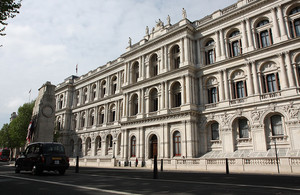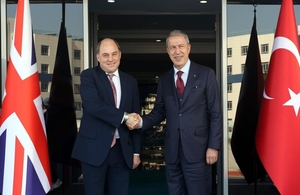Secretary of State for Northern Ireland Chris Heaton-Harris has met with young people at Queen’s University Belfast as he discussed plans to mark the 25th anniversary of the Belfast Good Friday Agreement in 2023.
Mr Heaton-Harris was welcomed today (Wednesday 26 October) by Queen’s University Vice-Chancellor Professor Ian Greer, who discussed the university’s upcoming programme of events to mark the anniversary. This includes a major international conference organised jointly with the Senator George J. Mitchell Institute for Global Peace, Security and Justice, at Queen’s.
Speaking with students as he visited One Elmwood, Queen’s University’s new Student Centre and Students’ Union, the Secretary of State highlighted the vital role which education plays in improving understanding and recognition of the transformative role that the Belfast (Good Friday) Agreement has played, and continues to play, in Northern Ireland and the rest of the UK.
He stated: “The 25th anniversary of the Belfast (Good Friday) Agreement marks an extraordinary achievement for Northern Ireland, with the Agreement helping to lay the foundation of a more peaceful and prosperous Northern Ireland that we see today.
“I’m delighted to hear about Queen’s University Belfast’s programme, and to discuss with young people what the anniversary means to them – they are key to safeguarding the benefits of the Agreement for the next generation.
“This anniversary moment provides us with a great opportunity to ensure that young people in Northern Ireland, and across the entirety of the UK, are well informed and can fully engage with the progress that has been made since the signing of the Agreement.
Queen’s University’s President and Vice-Chancellor, Professor Ian Greer, said:
“Queen’s University Belfast is honoured to be the host the signature event to mark the 25th anniversary of the signing of the Good Friday Agreement.
“With current world leaders, as well as architects of the original Agreement, coming to Belfast to mark the anniversary it is fitting that it takes place in an institution which places social and civic responsibility at the heart of what it does.
“In partnership with the Senator George J. Mitchell Institute for Global Peace,Security and Justice, the three day conference will offer a unique opportunity to both reflect on the achievements of the Agreement and to discuss the challenges and solutions needed to drive forward a peaceful and prosperous future for the region.”
ENDS
For media queries, contact communications@nio.gov.uk

